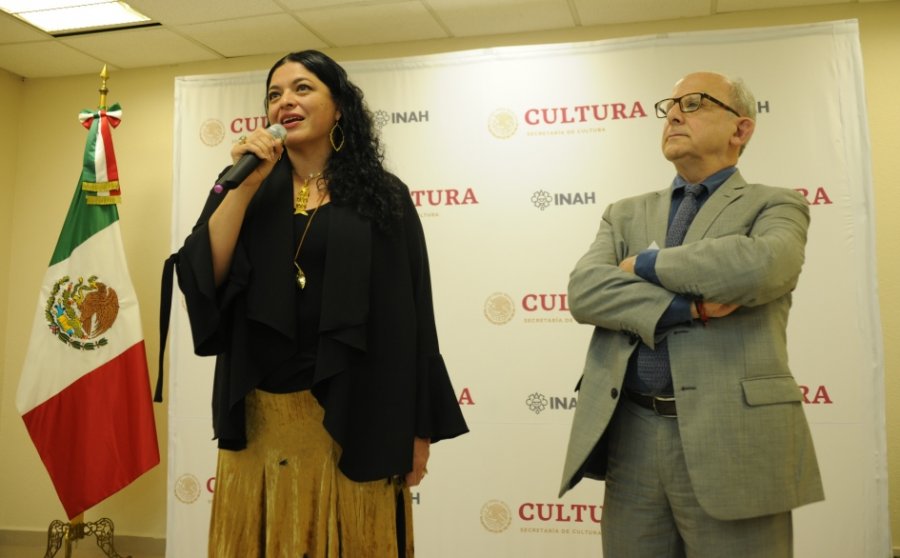Noticias
Alejandra Frausto ratifies Diego Prieto Hernández as General Director of INAH
December 07, 2018With the task of contributing to the positioning of culture and Mexican cultural rights as main points of public action, the Secretary of Culture, Alejandra Frausto Guerrero, ratified anthropologist Diego Prieto Hernández as general director of the National Institute of Anthropology and History (INAH, for its acronym in Spanish).
In a solemn ceremony held in the main hall of the INAH headquarters building, the official said that the aim of President Andrés Manuel López Obrador’s administration, for which, she said, the support of the institute and all those who work in it will be essential, is no longer to see culture as an accessory to political administration, but as its quintessence.
"Our task is to move from the idea of “the culture of power” to that of “the power of culture”, said Alejandra Frausto, recalling that since the beginning last December 1, a series of activities related to this purpose were undertaken, such as the opening of the former presidential residence of Los Pinos, a cultural center today, and the dialog with indigenous comunities that later handed the baton to the president.
She said that for the fulfillment of the strategic programs announced by the Executive Power, the support of the INAH to the department in charge and to the government in general, will be vitally important according to the positioning the institute has achieved in its almost 80 years of existence and experience in cultural life, especially within the indigenous communities and the less favored populations.
The secretary of Culture affirmed that in order to achieve the social reconstruction of the country there are several challenges ahead, among them, to complete the restoration of the cultural heritage affected by the earthquakes of September 2017, for which the collaboration of INAH specialists is essential, she said.
"In many communities we have seen that the people themselves are organizing to produce textiles and products with which to finance the reconstruction of their homes and the restoration of their heritage. In these cases, what we are looking for is to help with these efforts, creating, for example, trade schools and workshops, and bringing government offices closer to the communities.
In this sense, after thanking Alejandra Frausto and, through her, President Andrés Manuel López Obrador for the deference implicit in his ratification as head of INAH, anthropologist Diego Prieto confirmed his three work objectives.
First of all, he pointed out citizens as beneficiaries of cultural policy actions, "because they are precisely the individuals who produce, reproduce, signify and give meaning to the cultural heritage of our nation”.
Also, he will focus on encouraging the country's 500 work centers and 31 INAH Centers prioritize the social meaning of their work, while, as a third objective, they promote a wider dialogue with the three orders of government.
He recalled that the INAH is responsible for a total of 191 archaeological areas open to the public in the Mexican territory, as well as the Rincón Colorado Paleontological Area, recently inaugurated in Coahuila. It also operates a network of 125 museums and collaborates with several communities for the realization of community museum projects.
"I assume with honor and pride my ratification, but also with an enormous commitment and a great awareness of the task entrusted to me," said Diego Prieto.
The anthropologist assured the Department of Culture that INAH and its areas of competence will collaborate with the government of Mexico to promote the priority objectives of the 2018-2024 administration, among which he cited the pacification of the country, the fight against corruption and inequality, the strengthening of the rule of law, as well as the support to infrastructure projects such as the Tren Maya and the Corredor Transístmico.
Diego Prieto Hernández is a social anthropologist from the National School of Anthropology and History (ENAH, for its acronym in Spanish), with a master's degree in Anthropological Sciences from the Metropolitan Autonomous University (UAM) Iztapalapa Unit. He has held at INAH the positions of technical secretary, national coordinator of Anthropology and director of the INAH Querétaro Center.
He worked as a professor-researcher at INAH and the Autonomous University of Querétaro (UAQ). He is also the author of numerous publications and research focused on topics such as ethnography, social movements, cultural heritage and cultural policies.
Among his works as author and co-author, the following books can be mentioned: Los pobres del campo (The poor of the Queretaro countryside). Política social y combate a la pobreza en el medio rural de Querétaro (Social policy and the fight against poverty in rural Querétaro) (2003), Políticas culturales en México: 2006-2020. Hacia un plan estratégico de desarrollo cultural (2006) and Los pueblos indígenas de la Huasteca y el semidesierto queretano. Ethnographic Atlas (2013), to cite a few.
Mexico
